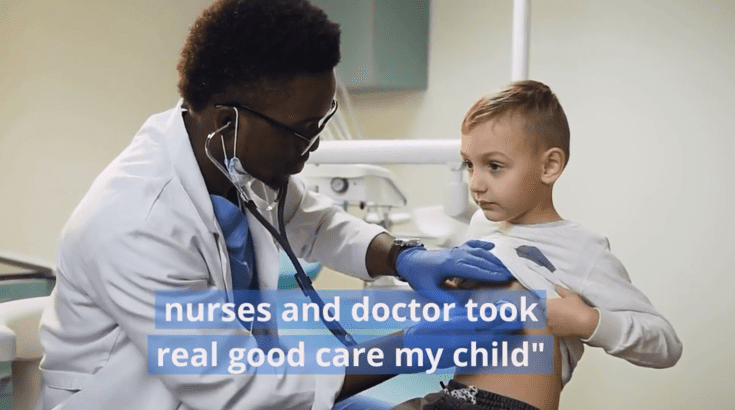Welcoming a newborn into the family is a momentous and joyous occasion, but for new parents, the baby’s arrival also brings a wave of questions and concerns, especially on issues regarding the baby’s health.
Amidst the sleepless nights and endless diaper changes, one significant event stands out as a beacon of reassurance and a source of valuable guidance—the first pediatric visit. This first encounter with the pediatrician is a milestone!
The first pediatric visit is an opportunity for parents to bring up their concerns and receive professional guidance. From feeding and nutrition to growth milestones, sleep patterns, immunizations, and safety, parents have an array of questions they need answers to.
Understanding these common concerns and how pediatricians address them helps parents feel prepared and confident. In this blog, we will touch on the most common concerns parents have during their baby’s first pediatric visit, offering insights to help navigate this critical time with greater ease and assurance.
Whether you’re a first-time parent or adding another member to your growing family, this guide hopes to equip you to provide a healthy start for your little one. Here are some of the most common concerns parents have during their baby’s first pediatric visit:.
Feeding and Nutrition
1. Breastfeeding vs. Formula Feeding

One of the primary concerns on the first pediatric visit revolves around feeding. Parents would ask whether to breastfeed or use formula. While breastfeeding is highly recommended due to its numerous health benefits for the mother and baby, some parents face challenges and obstacles.
Breastfeeding offers a wide array of benefits, such as providing ideal nutrition, strengthening the baby’s immune system, and fostering the bond between mother and child. However, it’s not always a smooth journey for all mothers.
Latching problems arise when the baby has difficulty attaching to the breast, leading to ineffective feeding and discomfort for the mother. Milk supply issues are another common challenge. Some mothers experience insufficient milk production, while others produce an excess. Also, breastfeeding can sometimes be painful due to sore nipples or infections like mastitis.
For parents who decide to use formula, either as a supplement or a primary source of nutrition, pediatricians ensure they understand the different types of formula available and how to prepare and store it safely. Formula feeding is a convenient alternative and a healthy option, especially when breastfeeding isn’t possible or preferred.
During the first pediatric visit, doctors provide tailored advice based on the individual needs of the mother and baby. They offer practical tips for successful breastfeeding, such as optimal feeding positions, ensuring proper latch, and managing milk supply.
Pediatricians provide support by discussing breastfeeding tips and addressing concerns. When specialized support is needed, pediatricians may refer parents to lactation consultants, who can provide one-on-one assistance.
2. Feeding Frequency and Amount
Parents frequently question during the first pediatric visit how often and how much their baby should eat. Newborns typically eat every 2-3 hours, but the exact frequency and amount can vary. Pediatricians help parents understand hunger cues and establish a feeding schedule that ensures the baby is getting adequate nutrition.
Growth and Development
3. Weight Gain
Monitoring a baby’s weight gain is crucial in the early days. Parents often worry if their baby is gaining enough weight. Pediatricians use growth charts to track progress and provide reassurance or intervention if necessary. They educate parents on what constitutes normal weight gain and when there might be cause for concern.
4. Milestones
Parents are eager to know if their baby is hitting developmental milestones. They often ask during the first pediatric visit when their baby should start smiling, cooing, rolling over, or sitting up. Pediatricians provide a timeline for these milestones and assess the baby’s development during checkups. They also offer advice on activities to support the baby’s growth and development.
Sleep Patterns
5. Sleep Duration
Understanding infant sleep patterns is a major concern. Newborns sleep a lot, but not always in long stretches, which can be exhausting for parents. Pediatricians offer guidance on safe sleep practices, creating a sleep-friendly environment, and establishing a sleep routine.
6. Safe Sleep
Safe sleep practices are critical in preventing Sudden Infant Death Syndrome (SIDS). Parents often worry about the best sleep position, bedding, and crib safety. Pediatricians emphasize placing the baby on their back to sleep, using a firm mattress, and keeping the crib free of soft bedding and toys.
Health and Immunizations
7. Vaccinations
Immunizations are a top concern for parents, especially during the first pediatric visit. Questions about the safety, schedule, and necessity of vaccines are common. Pediatricians explain the benefits and risks, the diseases vaccines prevent, and address any misconceptions or fears. They also provide a vaccination schedule and discuss what to expect after immunizations, such as mild side effects.
8. Common Illnesses
Parents often worry about common illnesses and how to handle them. During the first, pediatric visit, they seek advice on recognizing signs of infection, when to call the doctor, and basic home care. Pediatricians educate parents on common conditions like colds, fevers, and digestive issues, including guidance, prevention, and management.
Hygiene and Skin Care
9. Diaper Rash
Diaper rash is a frequent concern due to its discomfort for the baby. Parents ask for advice on prevention and treatment. Pediatricians recommend frequent diaper changes, the use of barrier creams, and keeping the diaper area clean and dry.
10. Bathing
Questions about how often to bathe the baby and what products to use are common. Pediatricians suggest gentle, fragrance-free products and advise on the appropriate frequency of baths to maintain skin health without causing dryness.
Bonding and Emotional Health
11. Parent-Baby Bonding
Parents are eager to ensure they are bonding effectively with their babies. They ask about the best ways to interact and soothe their newborn. Pediatricians emphasize the importance of skin-to-skin contact, talking, singing, and responding to the baby’s cues to foster a strong emotional connection.
12. Postpartum Depression
The emotional health of the mother is another critical concern. Pediatricians screen for signs of postpartum depression and provide resources for support and treatment. They encourage open communication about mental health and emphasize the importance of self-care and seeking help when needed.
Safety
13. Car Seat Safety
Ensuring the baby’s safety during travel is paramount. Parents often have questions about car seat installation and usage. Pediatricians provide guidelines on choosing the right car seat, proper installation, and ensuring the baby is securely fastened.
14. Home Safety
Creating a safe home environment is another significant concern brought up during the first pediatric visit. Parents ask about baby-proofing their home, safe sleep practices, and general safety tips. Pediatricians offer advice on securing furniture, using safety gates, and keeping hazardous items out of reach.
Medical Procedures and Screening
15. Newborn Screening Tests
Newborn screening tests are conducted to detect early signs of certain conditions. Parents often have questions about these tests, their importance, and what the results mean. Pediatricians explain the purpose of each test, the conditions being screened for, and the follow-up steps if any abnormalities are detected.
16. Circumcision
For parents of boys, circumcision is a common topic during the first pediatric visit. They seek advice on the pros and cons, the procedure itself, and post-care. Pediatricians provide unbiased information to help parents make an informed decision and offer guidance on caring for the circumcision site if they choose to proceed.
Environmental Concerns
17. Exposure to Toxins
Parents are increasingly aware of environmental toxins and their potential impact on health. They ask about minimizing exposure to harmful substances such as pesticides, BPA, and household chemicals. Pediatricians advise on choosing safer products, maintaining a clean living environment, and reducing exposure to secondhand smoke.
18. Air Quality
Indoor air quality is another concern, especially for families living in urban areas. Parents ask, during the first pediatric visit, about the effects of pollution on their baby’s health. Pediatricians offer tips on improving indoor air quality, such as using air purifiers, ensuring proper ventilation, and avoiding smoking indoors.
Give Your Baby a Healthy Start in Your First Pediatric Visit

The first pediatric visit is significant for new parents, allowing them to address varied concerns and gain reassurance about their newborn’s health and well-being. From feeding and nutrition to growth milestones, sleep patterns, immunizations, and safety, the questions parents bring to this visit are as varied as they’re important.
In this momentous encounter, pediatricians play a crucial role in clearing doubts, providing expert guidance, and ensuring the baby’s and parents’ peace of mind. The reassurance and professional advice received during the first pediatric visit lay a strong foundation for a healthy start in the baby’s life and peace of mind for the parents.
Omega Pediatrics is the pediatrician of choice for your newborn. They make every encounter a positive experience that you and your baby will cherish. They provide you with the knowledge and guidance you need to navigate the early stages of parenthood with greater confidence.
For mothers out there, veterans and newbies, you’re doing your best for your baby’s health and happiness. Come book an appointment with Omega Pediatrics.




